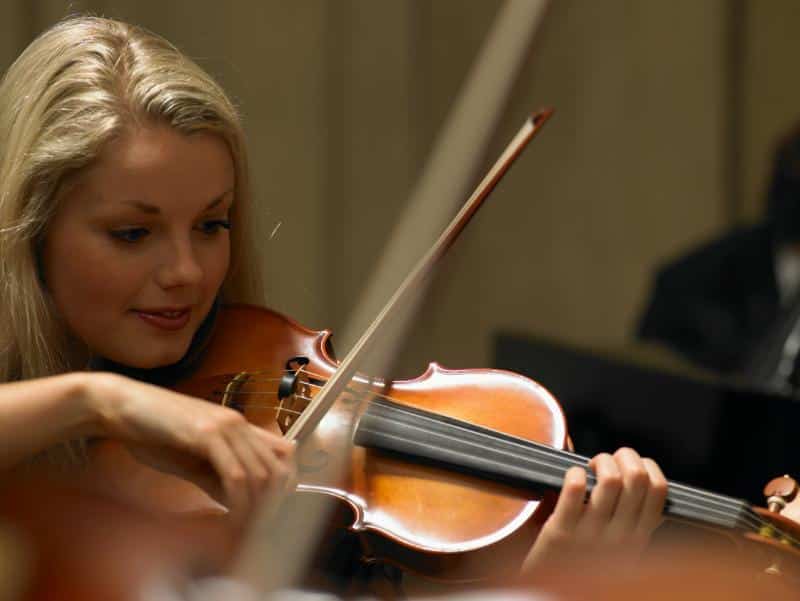Music transcends language, beliefs, and backgrounds. It uses instruments, melodies, rhythm, and sometimes words to capture the human experience. It can bridge the gap between past and present to reflect the mindset and events of the current landscape.
As a music graduate, you can stand at the forefront of this exciting field.
Your knowledge of music theory and sounds from across the globe has helped you develop a keen ear for different kinds of music. While you may have a preferred genre, you can pull inspiration from all music when creating your own. Graduating from Berry College’s Music program or one similar offers academic tracks that lead to a variety of careers, from performing and music education to the business side of the music industry.

Whether you dream of performing on stage, managing the next big hit, or educating the next generation, your skills can suit various career paths. Here are 8 jobs you can pursue with a degree in music.
Music Teacher or Band Director

As a music teacher, you can teach music literacy to learners of all ages. You can offer individual or group sessions in public or private settings. You can help your students prepare for an upcoming audition or become stronger singers. You may also teach beginners how to plan an instrument.
As a band director, you’ll help an ensemble or soloist prepare for an upcoming show. You’ll conduct tryouts, create lesson plans, organize events, order necessary supplies, and more.
As you broaden your students’ understanding of music theory, you’ll deepen their appreciation for music. Exposing students to various musical styles and genres can expand their toolkit and help them develop a diverse musical palette. Doing this can also help students step out of their comfort zone, try new things, and discover new facets of their abilities.
You’ll teach your students how to read sheet music and scales, sight reading, improve their stage presence, and more. You’ll help students build a strong musical foundation, refine their skills, and develop their unique style.
Composer
As a composer, you can choose to work in film, musical theater, TV, or video games. Your music will create various moods and capture the nuances of specific characters. Your scores can heighten the impact of scenes unfolding before the audience and evoke various emotional responses.
Depending on your niche, you may collaborate with filmmakers, music directors, orchestras, or producers when creating compositions. You’ll pull from your knowledge of various instruments and musical styles to create dozens of musical scores.
These scores can range from elaborate instrumentals, or piano chords with a melody and rhythm. You could write instrumentals or songs with lyrics. Each score you create should convey something about the character to the audience.
Performing Songwriter

You can work alone or collaborate with others to create your own original pieces. As a performing songwriter, you’ll write the harmonies, lyrics, and melodies for your own music. Being comfortable playing an instrument, reading music sheets, writing music, and singing can take you far in this career path.
Behind the scenes, you’ll oversee the writing, recording, and marketing of your music. You’ll also schedule tours and perform onstage to continuously build awareness, nurture your fan base, and grow your audience. In this role, you’ll often shift between artist, songwriter, and manager.
Remaining open to feedback and new musical influences can help you grow your career.
Maestro
Artistry, technicality, management, and history converge in this career path.
As a maestro, you’ll research the historical context of each music sheet to better understand its original intent. You’ll blend this intent with your unique interpretation to help each score resonate with modern audiences. You’ll guide the orchestra musicians throughout the performance by signaling changes in tempo, volume, timing, and more.
Between performances, you’ll book venues, choose the musical pieces for upcoming performances, and schedule and oversee rehearsals. You’ll oversee the audition and hiring process for new musicians and help fundraise for each performance.
Orchestra Musician

If you’re classically trained and love playing brass, percussion, woodwind, or string instruments, this might be an ideal path for you. As an orchestra member, you’ll learn new pieces, rehearse, and perform as part of an orchestra.
You’ll strive to find harmony with the other orchestra members while injecting passion and skill into each note you play. As you gain more experience, you can be promoted within your section until you become a principal player. As a section leader, or first chair, you assist in leading your section throughout each performance.
Your experience as an orchestra musician can prepare you for careers as a soloist, music teacher, or maestro.
Copyist
As a copyist, you’ll listen to melodies and harmonies and then write them as scores. You’ll create music sheets for each instrument you hear and ensure they blend seamlessly together. You’ll proofread and edit each score to create polished pieces for musicians.
You may be requested to change the pitch to better suit the vocalist or transpose the sheet for another instrument. The scores you create can be provided to composers, maestros, orchestra members, and more.
Music Journalist
Although this role won’t have you creating music, it allows you to analyze and critique current music. You can draw connections between musical trends and current society to provide additional insight into current times. You’ll embed yourself in the music scene by attending and reviewing concerts, reporting on the latest releases, and delivering the latest news from reliable sources.
You can dive into a genre of your choosing and cater your work toward specific audiences. You’ll combine your knack for storytelling and music appreciation into compelling feature stories and artist profiles. You can express your personal perspective on a recent song or album release to resonate with the reader’s experiences and interpretations.
As a music journalist, you’ll work on pieces assigned to you and pitch new story ideas to your editor. You’ll build and maintain industry connections which can be invaluable for leads on potential stories and artist interviews.
Talent Manager
You’ll wear a variety of different hats as a talent manager. You’ll be the brand advisor, support system, and advocate for your artist. Each action you take will be in your talent’s best interest and help advance their career.
From planning album projects to negotiating contracts, you’ll make sure your artist is treated fairly and appropriately compensated. They work closely with artists to establish long-term career goals and create plans to accomplish them. You’ll likely work with multiple artists simultaneously and guide them throughout their careers.
Having a background in management, finance, and the music industry can help you make wise business decisions. It can also ensure you and your client aren’t being taken advantage of during the negotiation process.
Explore Diverse Roles in the Music Industry
Your abilities have the potential to shape the way audiences and young learners perceive and understand music. You’re equipped with the technical skills and appreciation for an art form that can resonate with audiences across the globe.
Your unique style, voice, perspective, and experiences can open doors to endless possibilities for artistic expression and growth. Whether reporting on the latest music releases or teaching your student to play their first set of scales, your skills can enrich the lives of others and the world of music.
